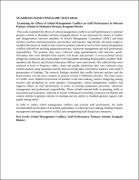| dc.description.abstract | NGABIRANO BONICONSILII (2007-MO53-10014)
Examining the Effects of School Management Conflicts on Staff Performance in Selected Primary Schools in Makindye Division, Kampala District.
This study examined the effects of school management conflicts on staff performance in selected primary schools in Makindye division, Kampala district. It was motivated by reports of clashes and disagreements between members of School Management Committees (SMC) and head teachers; teachers with head teachers and teachers with teachers. Specifically, the study sought to establish the nature of conflicts that existed in primary schools as well as how school management conflicts affected the teaching preparation process, classroom management and staff professional responsibility. The primary data were collected using questionnaires and interview guide. Secondary data were obtained from reports, text books and journals. A cross-sectional survey design was conducted and a total sample of 90 respondents including head teachers, teachers, SMC members, the District and Division Education Officers were interviewed. The collected data were analysed in form of frequency tables, charts and graphs. Qualitative data were analysed using content analysis using quotations and the most occurring ideas. Descriptive statistics were used in presentation of findings. The research findings revealed that conflict between teachers and the head teachers was the most common in primary schools in Makindye division. The main causes of conflict were: limited involvement of teachers in decision making, rumour mongering among teachers and alcoholism by some teachers. Consequently, school management conflicts had negative effects on staff performance in terms of teaching preparation processes, classroom management and professional responsibility. These include reduced skills in planning, skills in assessment and evaluation, reduction in teacher enthusiasm in teaching, classroom facilitation and control, decline in genuine interest of teaching and low ability to establish genuine rapport with pupils among others.
In order to reduce school management conflicts and increase staff performance, the study recommended involvement of all school stakeholders in school decision making, holding frequent management meetings to resolve conflict and strengthening staff disciplinary measures.
Key words: School Management Conflicts, Staff Performance, Primary Schools, Kampala District. | en_US |


